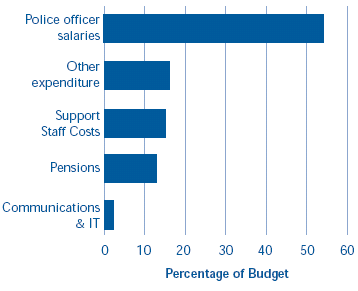Airwave should solve the problems with existing communications but will cost considerably more
1.18 Problems with existing communications systems should be solved by Airwave by the end of the roll-out period in 2004-5. Early indications are that the quality of voice transmissions is greatly enhanced in the new system. Short text messaging, talk groups, encryption and emergency buttons are already enabled and the contracted level of coverage will be guaranteed once agreement is reached on measuring it. Full national roaming is to be provided by 2004-5 when the entire infrastructure has been built.
1.19 Airwave will be considerably more expensive than operating either existing systems or new locally procured systems. Because many police forces do not disaggregate their spending on radio communications from other IT systems, it is difficult to determine accurately what forces currently spend on their existing systems (see Figure 3). As part of the Business Case for the project, PITO estimated that, on average, forces were spending 0.8 per cent of their annual budget. The Airwave service would cost approximately two per cent of the annual budget or £180 million a year.1
3 |
| Breakdown of Police Spending |

Source: CIPFA Police Statistics |
1.20 The average figure for expenditure on radio systems hides wide variations between individual police forces. PITO considers that, in many cases, forces had under-provided in this area for a number of years because a national system was anticipated. However, some forces procured more sophisticated systems, for example, Metradio for the Metropolitan police and Starnet for Staffordshire police, even though plans existed for a national project. These forces successfully argued that their operational needs were so pressing that they could not afford to wait. The cost of these local systems is approximately one third of the Airwave system, however they still use analogue technology and do not provide the enhanced functionality of Airwave, such as encryption or data transfer. They also do not have the facility for national roaming and so would not meet all of the criteria laid out in the major review.
1.21 Although there was widespread support for the introduction of a new radio service, the cost of Airwave was thought by many police authorities to be prohibitive. There was a prolonged period of consultation and lobbying for additional funds, with some authorities claiming they might need to reduce officer numbers in order to pay for Airwave. Several authorities initially refused to sign their Airwave contracts, claiming they had an obligation to pursue local best value not national best value and that Airwave would involve, for English and Welsh forces only, additional expenditure of some 300 million, when compared against a series of less ambitious, locally procured solutions (see paragraph 2.40).
1.22 In July 2000, the Government announced the allocation of 500 million for Airwave over the first three years of the contract. This new money will pay for all Contracted Core Service costs and will make a significant contribution to capital and revenue expenditure as well as other costs associated with implementation, such as training. Following this allocation of funds, all the police forces of England and Wales signed up to the Airwave deal.
_______________________________________________________________________________
1 This figure is the total annual charge to the police and PITO for Core and Menu Services at the end of the rollout period expressed in 1999 prices. Airwave will cost a total of £1,470 million over the contract period, discounted at 6 per cent real to 1999.